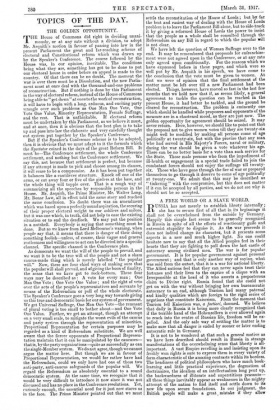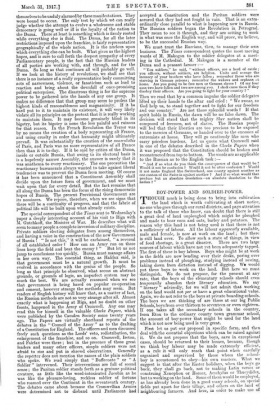A FREE WORLD OR A SLAVE WORLD. R USSIA has not
merely to establish liberty internally ; she has to secure first of all that in its beginnings it shall not be overwhelmed from the outside by Germany. Happily this simple fact seems to be generally recognized in Russia in spite of all the efforts of reactionary guile and extremist stupidity to disguise it. As the war proceeds it does not indeed change its character, but it presents some aspects in a new and much higher light. No one could hesitate now to say that all the Allied peoples feel in their hearts that they are fighting to pull down the last castle of autocracy among civilized men. The war is for popular government. It is for popular government against personal government ; and that is only another way of saying, what was said from the outset, that it is a war for national liberty. The Allied nations feel that they can never again trust their fortunes and their lives to the caprice of a clique with an Irresponsible at the head of it who asserts a preposterous claim to Divine right. Russia found that she could not get on with the war withOut bringing her own bureaucratic autocracy to an end, although Tsarism had many paternal and kindly qualities which are foreign to the rigid series of negations that constitute Kaiserism. From the moment that Tsarism fell Kaiserism was, a fortiori, doomed. We believe that daily in Russia it is being more clearly recognized that if the terrible hand of the Hohenzollern is ever allowed again to reach into the centre of Russian life, freedom will be ex- pelled. And the only safe way of settling the matter is to make sure that all danger is ended by sooner or later ending autocratic rule in Germany. It is not to be wondered at that such a general motive as we have here described should result in Russia in strange manifestations of the overwhelming sense that liberty is all- important. A vast Empire revelling in and insisting upon its freshly won rights is sure to express them in every variety of form characteristic of the amazing contrasts within its borders. The headiness of political philosophers who have much book- learning and little practical experience, the dogmatism of doctrinaires, the idealism of an intellectualism long pent up, the backwardness of illiterate and superstitious peasants— all these things inevitably appear as weaknesses in the mighty attempt of the nation to find itself and settle down to its new life upon secure foundations. In our judgment, the British people will make a great, mistake if they allow themselves to be unduly alarmed by these manifestations. They were bound to occur. The only test by which we can really judge whether the attempt to evolve a wholesome and stable democracy is going well or ill is the loyalty of the nation to the Duma. There at least is something which is firmly rooted while everything else is fluid. The Duma, for all the later restrictions imposed upon the franchise, is fairly representative geographically of the whole nation. It is the nucleus upon which everything else can be built. What gives us the highest hopes, and is sure to call forth the deepest sympathy of every Parliamentary people, is the fact that the Russian leaders of all parties are working with, and through, and for the Duma. So long as that continues all will probably go well. If we look at the history of revolutions, we shall see that there is no instance of a really representative body committing acts of narrowness, violence, or fanaticism such as lead to reaction and bring about the downfall of once-promising political enterprises. The disastrous thing is for the supreme power to be gathered into the hands of any one group. It makes no difference that that group may seem to profess the highest kinds of reasonableness and magnanimity. If it be hard put to it to maintain its existence, it will very likely violate all its principles on the pretext that it is really working to maintain them. It may become genuinely blind in its bigotry, but its bigotry is none the less painful and ruinous for that reason. In the French Revolution the Terror was by no means the creation of a body representing all France, and using cruelty in order that humanity might ultimately prevail. It was substantially the creation of the sansculottes of Paris, and Paris was no more representative of all Franco then than it is to-day. If it be said by critics of the Duma, inside cr outside Russia, that owing to its electoral basis it is a hopelessly narrow Assembly, the answer is surely that it was anathema to every reactionary. The one precaution the reactionary bureaucrats always wanted to take against liberal tendencies was to prevent the Duma from meeting. Of course it has been announced that a Constituent Assembly shall decide upon the future form of government, and we must wait upon that for every detail. But the fact remains that all along the Duma has been the focus of the rising democratic hopes of Russia. The present Provisional Government are its nominees. We rejoice, therefore, when we see signs that there will be a continuity of progress, and that the fabric of political life will be built upon what already exists.
The special correspondent of the Times sent to Wednesday's paper a deeply interesting account of his visit to Riga with M. Gutchkoff, the Minister of War. He describes what will seem to many people a complete inversion of military discipline. Private soldiers electing delegates from among themselves, and having a voice in the construction of the new Government of Russia ! " Is not this," it will be exclaimed, " a reversal of all established order ? How can an Army run on these lines keep the field and beat the enemy " But let us not jump to conclusions too quickly. Russia must manage affairs in her own way. The essential thing, as Halifax said, is that government must be a natural growth. It must be evolved in accordance with the genius of the people. So long as that principle be observed, what seems on abstract grounds, or grounds of logic, an imperfect system may be much the best. We are actually reassured when we see that government is being based on popular co-operation and consent, however strange the methods may seem. But readers of English history will know that, as a matter of fact, the Russian methods are not so very strange after all. Almost exactly what is happening at Riga, and no doubt on other fronts, happened in the Army of Crofnwell. Any one may read this for himself in the valuable Clarke Papers, which were published by the Camden Society some twenty years ago. The Papers are virtually shorthand reports of the debates in the " Council of the Army " as to the drafting of a Constitution for England. The officers and men discussed freely such questions as the Lords' veto, redistribution, the enlargement of the franchise, and so on. Cromwell, Ireton, and Fairfax were there ; but in the presence of those great leaders and many other officers, simple soldiers were not afraid to rise and put in shrewd observations. Generally the repdrter does not mention the names of the plain soldiers who spoke. We read simply that " Buffecoate " or " A Soldier " intervened. Their interventions are full of sound sense ; the Puritan soldier stands forth as a geniune political creature, as little like the word-intoxicated Jacobin as he was like the pleasure-loving, reckless soldier of fortune who roamed over the Continent in the seventeenth century. The debates came about because the Cromwellian Armies were determined not to disband until Parliament had accepted a Constitution and the Puritan soldiers were assured that they had not fought in vain. That is an extra- ordinarily close parallel to what is happening now in Russia. The Russian soldiers began the Revolution in Petrograd. They mean to see it through, and they are setting to work in what was once the English way, and will prove, we believe, to be the successful Russian way.
We must trust the Russians, then, to manage their own business. The Times correspondent quotes the most moving words of M. Makogon to the soldier delegates at a meet- ing in the Cathedral. M. Makogon is a member of the Duma and a peasant farmer :- " You soldiers," he said, " without officers, are a herd of cattle ; you officers, without soldiers, are helpless. Unite and avenge the memory of your brothers who have fallen ; remember those who are starving in German prisons ; remember the widows and orphans at home. Are you going to be free men or German slaves ? Of my four sons two have fallen and two are among you. I shall curse them if they disobey their officers. Are you going to fight for your country ? "
Then we read that by a common impulse the soldier delegates lifted up their hands to the altar and cried : " We swear, so God help us, to stand together and to fight for our freedom and our country." Are not those splendid words ? If that spirit holds in Russia, the dawn will be no false dawn. The decision will stand that the mighty Slav nation shall be composed of freemen, not of slaves. The Russian people will feel that their liberties are too precious to be exposed to the mercies of Germans, or handed over to the excesses of extremists at home. They will go cautiously like men who carry priceless burdens. Let us quote what Cromwell said in one of the debates described in the Clarke Papers when it was proposed that the Constitution should be broken and reconstructed from top to bottom. The words are as applicable to the Russian as to the English task :- " And if so what do you think the consequence of that would be Would it not be confusion ? Would it not be utter confusion ? Would it not make England like Switzerland, one county against another as one canton of the Swiss is against another ? And if so what would that produce but an absolute desolation—an absolute desolation to the nation ? "



























 Previous page
Previous page